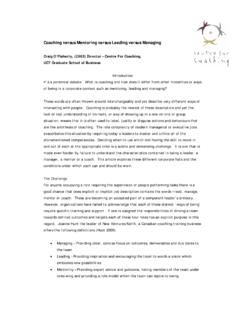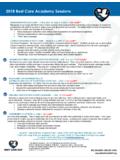Transcription of Coaching vs. Managing - Planned Success
1 Coaching vs. Managing Success Culture Beliefs & Models copyright 1998, Planned Success Institute Page 1 of 2 Coaching vs What is the difference between Coaching and Managing ? The distinction between Coaching and Managing is significant, and critical to establish-ing and maintaining a Success Culture in your organization. Exactly how is Coaching different from Managing ? Managing Coaching Command and Control Culture Success Culture a series of manipulations proceeding from presumed superior knowledge a series of invitations made from possibility and enlightened ignorance ideas, policies, directives, and initiatives flow downward ideas, policies and initiatives are mutually generated arbiter of outcomes facilitator of processes managers set expectations individuals set expectations for themselves with coach s assistance manager has all the answers!
2 Coach has all the questions! focuses on manager s perception of the individual s intrinsic worth focuses on how communication and beliefs produce behaviors manager withholds information, to protect employees coach tells the whole truth, trusts employees ability to absorb it focuses on what should be starts with what is drives the team to what should be through a series of directives invites team to mutually consider what could be parent-child relationship between manager and managed mentor-peer relationship between coach [mentor] and mentee Coaching vs. Managing Success Culture Beliefs & Models copyright 1998, Planned Success Institute Page 2 of 2 Coaching vs Managing is the primary leadership activity in the Command and Control Culture, where ideas, policies, directives, and initiatives flow downward from the top of the organizational pyramid.
3 The manager is the arbiter of what happens in his or her domain, as typified in the my way or the highway approach. Managers set expectations that others are expected to fulfill. If the others fail to fulfill those expectations, then it is the others who are at fault. A key [often unspoken] belief is that the manager is always right, and has all the answers. Managers withhold information, and speak those portions of the truth that they feel their people can handle. The manager speaks for and about himself when representing his domain. Managing looks at what should be , and then drives the team toward that place through a series of directives. The result of this entire process is to set up a parent-child relationship between manager and managed. Coaching is the primary leadership activity in Success Culture, where ideas, policies and initiatives are mutually generated, mutually considered, and mutually adopted by the team affected.
4 There are no directives in Success Culture, since it posits that people may only show up as passionate volunteers . Volunteers sign up, they don t submit. A good coach has all the questions, and very few answers. The coach is the facilitator of what goes on in his or her domain. Individuals set expectations for themselves individually and collectively, and the coach assists them in exploring their limits and in holding themselves accountable to those expectations. The coach tells the whole truth, trusting that his people can handle it. A key belief in Success Culture is that each team member contributes from their own area of unique genius the coach helps to identify and draw that genius out. The coach represents the team to ownership or other leadership teams, and speaks for the team. Coaching starts with what is , and then invites team members to consider what could be , and how they might get there through a shared vision.
5 The result of the Success Culture process is to set up a mentor-peer relationship between coach [mentor] and mentee. [END]






